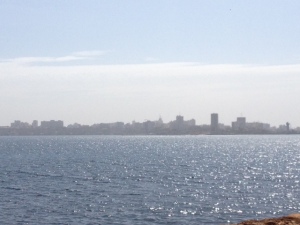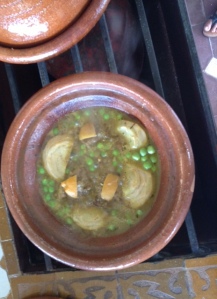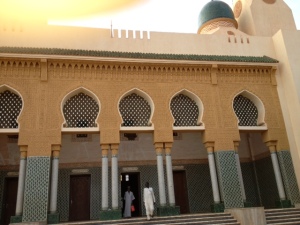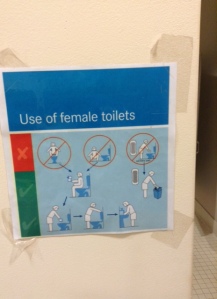The Conviction of Hissène Habré
Today, the Extraordinary African Chambers in Senegal convicted former Chadian dictator Hissène Habré, who ruled from 1982 to 1990, of crimes against humanity. Habré is accused of 40,000 politically-motivated killings and the torture of approximately 200,000 people before he was overthrown by the current…president Idriss Déby, who was his former chief military advisor.
Earlier this month, Human Rights Watch produced a very helpful Q&A: The Case of Hissène Habré before the Extraordinary African Chambers in Senegal.
Another interesting read is Our Man in Africa, for context on Habré’s relationship with the United States, which sought to counter Qadhafi in Libya.

SOURCE: @AFPAfrica
Can Regional Effort Uproot Boko Haram in Time for Nigeria Elections?
(Originally published in World Politics Review on February 13, 2015)
Last weekend, Nigeria’s electoral commission announced that, contrary to statements made just days prior by the chief of defense staff and the chief of army staff, the country’s security forces could not guarantee the safe conduct of presidential and parliamentary elections originally scheduled for Feb. 14 and 28. The commission postponed the poll for six weeks, the minimum time the security forces say they need to conclude a major military operation against militants from Boko Haram in northeastern Nigeria and before which they would be unavailable to provide security for the elections.
The presidential and parliamentary elections are now set for March 28, followed by local elections on April 11. As with previous—unfulfilled—official projections of Boko Haram’s demise, Nigeria’s national security adviser insists that the group’s camps will be dismantled by then. But there is already speculation that security concerns are being used as a pretext for President Goodluck Jonathan’s incumbent government to delay what is shaping up to be the most competitive election in Nigerian history. Jonathan has denied any role in the postponement decision.
(Read the Rest of the article on the World Politics Review website)
The Trans Sahara Counter Terrorism Partnership: Building Partner Capacity to Counter Terrorism and Violent Extremism in the Sahel & Maghreb
A few months ago, I published the study I had been working on during my IPA Assignment at the Center for Complex Operations at National Defense University – The Trans Sahara Counter Terrorism Partnership – Building Partner Capacity to Counter Terrorism and Violent Extremism. The study discusses the origins of TSCTP, which is rather unique by U.S. government standards, for its regional and interagency focus . It dissects the “anatomy” of the program (including which U.S. government agencies are involved, what their roles are, and who their partner nation counterparts are), and derives six functional areas of TSCTP engagement in order to better understand the program’s lines of effort across the various agencies. These are: Military Capacity-Building, Law Enforcement Anti-Terrorism Capacity-Building, Justice Sector Counterterrorism Capacity-Building, Public Diplomacy and Information Operations, Community Engagement, and Vocational Training. The study then discusses some of the planning and implementation challenges associated with a program of this nature, derived from the over 70 interviews I conducted across the interagency and in nine of the ten TSCTP countries (Algeria, Burkina Faso, Chad, Mali, Mauritania, Morocco, Niger, Nigeria, and Senegal) last year.
The study contains a lot of information on TSCTP, but as it’s rather dense, I also published a handful of shorter articles that either summarize or draw out some of the more salient points of the larger study:
- Catch-22 in the Sahel in the National Interest
- Nine Questions about the Trans Sahara Counter Terrorism Partnership you were too Embarrassed to Ask in War on the Rocks
- North and West Africa Seek to Jumpstart Regional Counterterrorism Cooperation in World Politics Review
Happy reading!
Catching up on CAR, trying to avoid clichés
If you’ve been following the news on the Central African Republic (CAR) over the past 13 months, you have probably seen many references to the country’s abundant mineral wealth, chronic instability, crushing poverty, sectarian (Christian vs. Muslim) strife, and allegations of genocide. Some of the recent analysis and media reporting goes beyond these clichés, so I thought I’d highlight them and explain why these pieces present the reader with a more complex understanding of recent developments in the country. Collectively, this reading list offers four things:
- These readings offer background on Catherine Samba-Panza, previously the mayor of Bangui, who was elected last week as the interim president of the Central African Republic. Beyond the fact that Samba-Panza is the first female to hold this position in CAR, these pieces offer insight as to why she’s different from previous leaders and what challenges she will face as she spearheads the transition to an elected government by February 2015.
- These readings offer a background of the events leading to and during the transition earlier this month, such as why Michel Djotodia (former leader of the Séléka rebel coalition that toppled former president François Bozizé last March) had to go and the process that dictated the selection of candidates for interim president.
- These readings offer a better understanding of identity in the Central African Republic beyond the Muslim/Christian labels, and gives the reader some perspective on notions of foreign-ness in the CAR and how they have come into play throughout the country’s history.
- Finally, these readings offer context on the historical and contemporary role of foreign – European AND African – influence on conflicts in the Central African Republic, which is critical for understanding the geopolitics of the region. Major headliners are France (bien sûr!), Chad, Libya, and South Africa.
So without further ado, here’s some of the good coverage I’ve read over the past few weeks:
- Central African Republic’s new president ‘a fresh start’ from the Institute for Security Studies
- Central African Republic: The Third Government in Thirteen Months Gets Under Way from the International Crisis Group
- Genocide-mongering does nothing to help us understand the messy dynamics of conflict in the CAR on African Arguments (by Louisa Lombard, who also blogs at Foole’s No Man’s Land)
- France, Chad, Gaddafi and the CAR: years of meddling should not be ignored now on African Arguments
- South Africa in the CAR: Was pulling the troops a catastrophic mistake? from the Daily Maverick (Last March, I had weighed in on the aftermath of South African casualties in the CAR with South Africa inspires a “Whiskey Tango Foxtrot” in the CAR. Best title EVER, right?)

Catherine Samba-Panza being sworn in as interim president of the Central African Republic (SOURCE: http://www.tvzimbo.com/)
Si vous lisez français, the articles below offer background on the new interim president, and why her civil society roots and Chadian/Central African heritage may make her the right leader at the right time:
- Catherine Samba-Panza: «Maire de Bangui, j’ai toujours eu de bonnes relations avec tout le monde» (Q&A with Catherine Samba-Panza: “Mayor of Bangui, I have always had good relations with everyone”) from Radio France Internationale
- Centrafrique : 5 choses à savoir sur Catherine Samba Panza la nouvelle présidente de transition (Five things to know about Catherine Samba-Panza the new transitional president) from Jeune Afrique
- Catherine Samba-Panza, nouvelle présidente de Centrafrique: pourquoi elle (Catherine Samba-Panza, the new president of the Central African Republic: why her?) from Radio France Internationale
Return to the Mothership
Yesterday was my first day back at CNA, the place I’ve affectionately called “The Mothership” for the past fifteen months of my assignment at the Center for Complex Operations. While at CCO, I was working on an analysis of the Trans Sahara Counter Terrorism Partnership (TSCTP), which is an interagency U.S. government program to counter terrorism and violent extremism in the Maghreb and Sahel. I’m hoping my report will be published by the end of February – inshallah.
Working on this project, I learned a lot about the complexity of foreign assistance, and how much more I have yet to learn on the topic. I’m a very hands on learner, so fortunately I had to travel to nine of the ten TSCTP countries. At the time I traveled, I’d accordingly code-named them for security reasons: African Country A (Niger), African Country B (Chad), African Country C (Mali), African Country D (Senegal), African Country E (Morocco), African Country F (Algeria), African Country G (Nigeria), African Country H (Mauritania), and African Country I (Burkina Faso).
Here’s a few pics from my travels & some blurbs about the kinds of things I got myself into when I wasn’t working.

View of the Niger River from my hotel room in Niamey

Niger Police Academy course

View of Dakar skyline from overloaded speedboat. When asked if the boat would make it back to Dakar, the guy driving said “On va essayer!” (We’re going to try!)

Riding a camel was on the bucket list, even though it’s très touristy. But I didn’t like the way this dude was looking at me.

I made my first tajine! It had chicken, peas, and artichokes. It was compellingly mediocre – but my teacher was not to blame.

The real reason my tajine was uninspiring was b/c THERE WERE KITTENS!!! I played with them instead of listening to the instructor.















You must be logged in to post a comment.